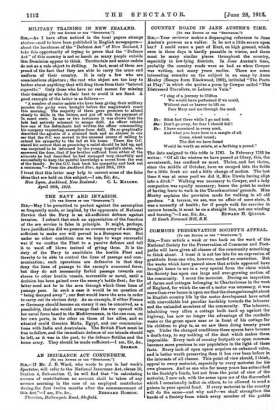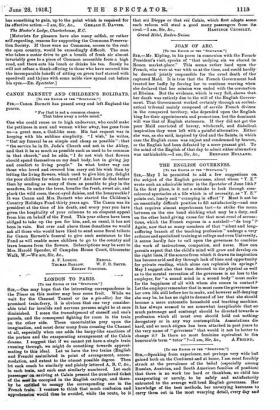COMMONS PRESERVATION SOCIETY'S APPEAL.
[To THE EDITOR OP THE " SPECTATOR."] SIR,—Your article a week or two back on the work of the National Society for the Preservation of Commons and Foot- paths will have given all classes of the community something to think about. I trust it is not too late for an expression of gratitude from one who, however, needed no conviction. But the weeks which have passed since that article appeared have brought home to me in a very special form the claim which the Society has upon one large and ever-growing section of the community. I mean the motorist. During an inspection of farms and cottages belonging to Charterhouse in the west of England, for which the use of a motor was necessary, it was more than ever borne in upon me that the changes brought about in English country life by the motor development have acted with unavoidable but peculiar hardship towards the labourer and the unlanded members of the community. The labourer, inhabiting very often a cottage built bard up against the highway, has now no longer the advantage of the roadside waste or the green space near or in front of his cottage for his children to play in, as we saw them doing twenty years ago. Under the changed conditions these spaces have become a death-trap, to say nothing of the dust which makes them impossible. Every inch of country footpath or open common becomes more precious to our population in the light of these facts. Every inch of open space acquires an enhanced value, and is better worth preserving than it has ever been before in the interests of all classes. This point of view should, I think, appeal to every motorist, especially to every motorist for his own pleasure. And as one who for many years has subscribed to the Society's funds, but not from the point of view of the motorist, I now ask, with the sense upon me of the discomfort which I occasionally inflict on others, to be allowed to send a guinea to your special fund. If every motorist in the country will do the same—and why not ?—we shall strengthen the hands of a Society from which every member of the publics
has something to gain, up to the point which is required 'for [Motorists for pleasure have also many selfish, or rather self-regarding, reasons for supporting the Commons Preserva- tion Society. If there were no Commons, access to the real, the open country, would be exceedingly difficult. The man who takes a motor drive to get a breath of fresh air almost invariably goes to a piece of Common accessible from a high road, and there eats his lunch or drinks his tea. Surely he will not refuse a thank-offering to those who have secured him the incomparable beitefit of sitting on green turf starred with speedwell and thyme with some noble view spread out before his eyes.—En. Spectator.]



























































 Previous page
Previous page